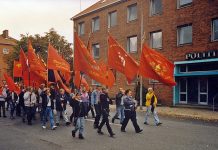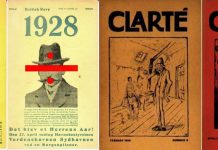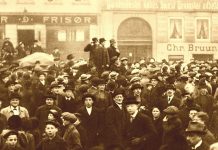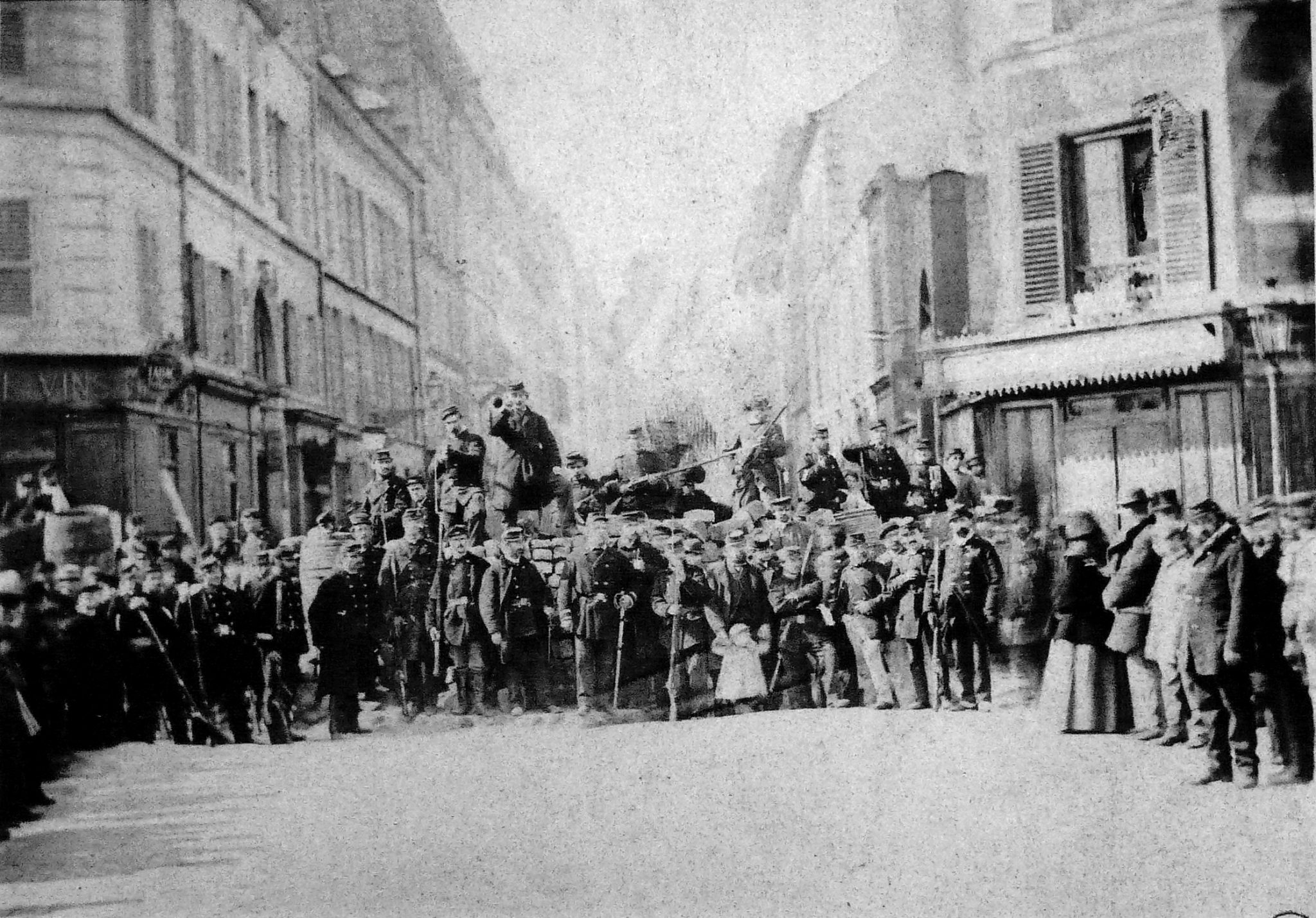
Emneliste om Pariserkommunen – historiens første proletariske revolution- og det første forsøg på at danne en ny socialistisk statsform, – i kølvandet på Den fransk-tyske krig i 1871.
Pariserkommunen er trods det korte forløb – 2 måneder – en af de vigtigste begivenheder for den fremvoksende arbejderbevægelse, ikke bare i Frankrig, men i resten af Europa, og i Danmark, hvor den gav anledning til dannelse af en dansk sektion af Internationalen, Første internationale **se Tidslinjen 22. maj 1871.
NB at allerede nr. 2 af ‘Socialistiske Blade behandlede kommunen: side 3-4, planche 14-15 i margen til venstre på siden: Socialistiske Blade, nr. 2, side 1-16.
.
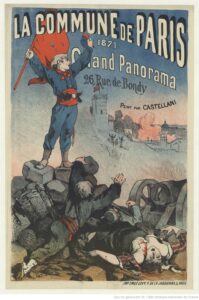
Indhold
- Forord
- Leksikalt (dansk og engelsk)
- Artikler mv. (dansk/skandinavisk)
- Sites
- Articles (engelsk)
- Historiske tekster og debat
- Litteratur
- Se også
Forord
Pariserkommunen starter 18. marts 1871: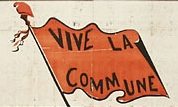
(Karl Marx: Adresse fra Generalrådet om borgerkrigen i Frankrig 1871 (Udvalgte Skrifter, bind 1, Forlaget Tiden, 1971, s. 511-518; online på Marxisme.dk).
Blandt de direkte følger af Pariserkommunen var initiativet til en dansk sektion af Internationalen, den organiserede danske arbejderbevægelses fødsel, se på Socialistisk Bibliotek:
Tidslinjen 22. maj 1871 om Louis Pios udgivelse af Socialistiske Blade. Især nr. 2 fra juli 1871 om Pariserkommunens nederlag, som fandt sted mellem udgivelsen af de 2 numre.
Tidslinjen 30. juni 1871 om Eugene Pottiers sang “Internationale” samt danske oversættelser.
Tidslinjen november 1871 om Holger Drachmanns digt Engelske Socialister:
… Det er ondt at sulte, naar man skal slide;
Vi vil ikke sulte, vi vil op paa Tribunen
Og dømme, — og Dommen skal hedde Kommunen! *
Selv om Drachmann ikke var en del af de første organiserede socialister, holder rimet i digtets sidste linjer kun, når man husker på, at de første generationer af danske socialister udtalte ‘Communen’ på ‘halv-fransk’, som ‘kommyne’.
Se også på Socialistisk Bibliotek:
- Tidslinjen 29. maj 1830 om kommunarden Louise Michel.
- Tidslinjen 1. februar 1805 om franske revolutionære Louis Auguste Blanqui.
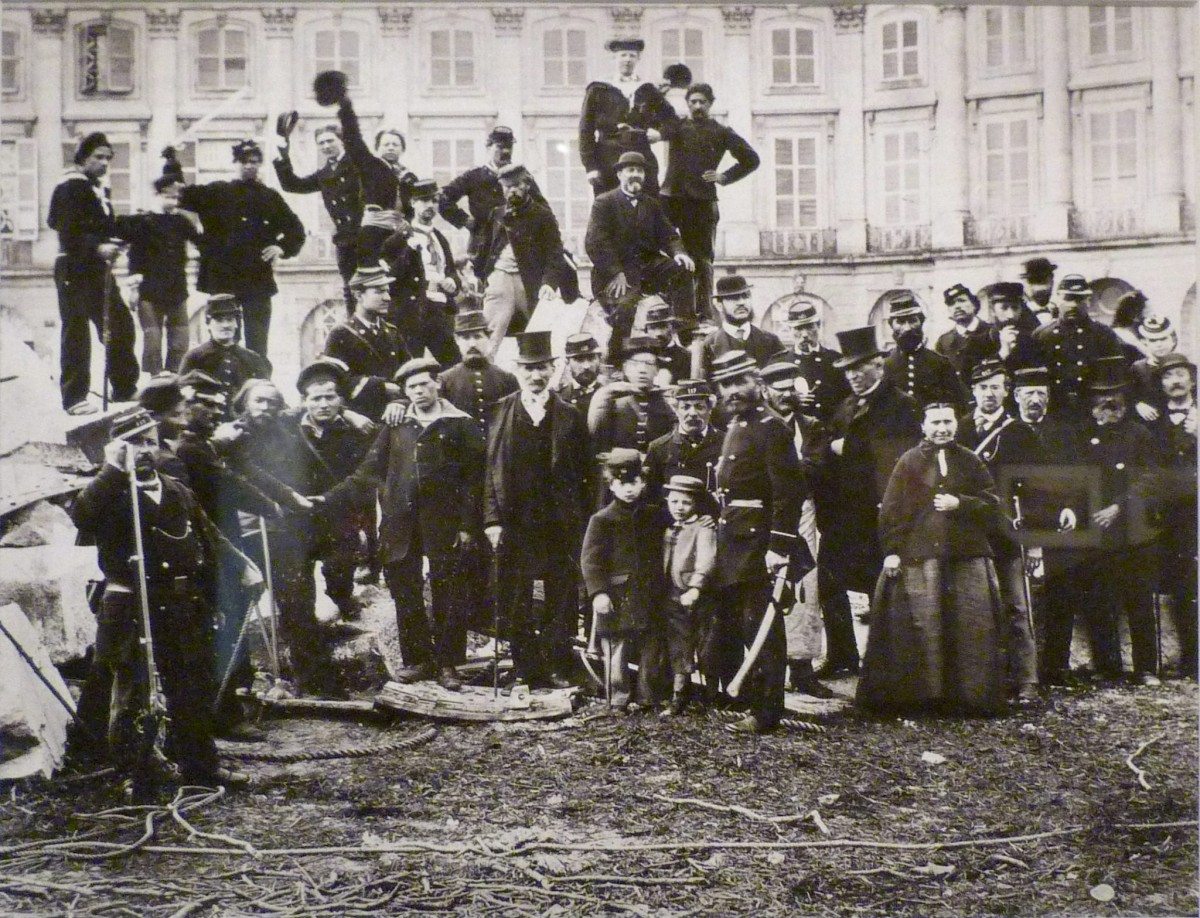
Leksikalt
- Pariserkommunen. Af Svein Erling Lorås (Leksikon.org) [NB med forkert billedtekst, det er ikke en barrikade i Paris, men ovenstående foto af Vendome-søjlens omstyrtere !].
- Pariserkommunen 1871 (Denstoredanske.dk)
- Paris Commune (Wikipedia.org). Godt linket artikel, med kun lidt reaktionær vinkel.
- Paris Commune (Marxists Internet Archive). Se også her Timeline.
Artikler mv. (dansk/skandinavisk)
Tema: Pariserkommunen (Socialister.dk). Artikler på dansk og engelsk.
Et autonomt folk? Fra Pariserkommunen til radikalt demokrati (Eftertrykket.dk, 23. oktober 2021).
“I dette essays konkretiserer Benjamin Ask Popp-Madsen, dels hvorledes denne arv fra Pariserkommunen øvede særlig indflydelse på de europæiske arbejderrådsbevægelser, og dels hvad arven fra Pariserkommunen kan lære os om demokratiforståelser i vores samtid.”
Tidsdoku. Pariserkommunen, der rystede Europas magthavere. Af Alfred Lang (Autonom Infoservice, 17. marts 2021). Tidligere udgave på Modkraft.dk (12. april 2006) + Konfront.dk (23. juli 2019).
“Den 18. marts 1871 rejste befolkningen i Paris sig imod den foragtede og forhadte regering og proklamerede et uafhængigt, frit og basisdemokratisk bysamfund. Her er Pariserkommunens historie.” Se også den kortere: Pariserkommunen for 150 år siden: Utopiens korte forår (Ibid., 5. april 2021).
150 år for Pariserkommunen: Da arbejderne tog magten for første gang (Socialistisk Arbejderavis, nr.386, 23. april 2021).
“Selv om denne begivenhed ligger langt tilbage i historien, og selvom Kommunen kun overlevede i 64 dage, så står Pariserkommunen fortsat centralt i arbejderklassens historie.” Sammenskrivning/redigering ved Charlie Lywood af to tidligere artikler i SAA: Ole Mølholm Jensen i nr. 7 (marts 1985) og Marie Jæger i nr. 307 (marts 2011).
Antonio Negri: “Pariserkommunen, autonomi og opløsning af staten” (Autonom Infoservice, 10. april 2021). Et interview:
“Antonio Negri tager udgangspunkt i Pariserkommunen og sætter derefter fokus på kommunistiske erfaringer i den senere transnationale verden.”
Pariserkommunen: En socialistisk styreform. Af Nicolai Von Eggers (Solidaritet.dk, 4. april 2021).
“Demokrati fra neden og radikale frihedsrettigheder. Den korte opstand i Paris lage fundamentet for en styreform, som kan erstatte den borgerlige parlamentarisme og sikre et socialistisk demokrati.”
Pariserkommunen i 1871. Af Michael Löwy (Socialistisk Information, 29. marts 2021).
“Den 18. marts 1871 tog befolkningen i Paris, der var belejret af preussiske tropper, kontrol med deres by og gennemførte i de næste 72 dage det første eksperiment med en tilværelse under folkelig kontrol.”
Pariserkommunen: Arbejderklassens første regering. Af John Westmoreland (Socialistisk Information, 20. marts 2021).
“Mellem marts og maj 1871 stod arbejderne i Paris i spidsen for deres by i form af en kollektiv, demokratisk arbejderregering kendt som Pariserkommunen.”
Folkets Røst er et storslået værk om Pariserkommunen. Af Peter Saxtrup (Solidaritet.dk, 18. marts 2021). Anmeldelse af Jean Vautrin & Jacques Tardi: Folkets Røst. 4 bind (Carlsen Comics, 2004).
“Folkets Røst er en glimrende introduktion til den revolution i Paris’ gader, der har 150-års jubilæum i dag. Jacques Tardis streg trækker oprøret ud af historiebøgerne, og gør den levende for nutidige læsere.”
150 år siden pariserkommunen og den første socialistiske revolution (Konfront.dk, 18. marts 2021).
“Konfront har oversat Pariserkommunens manifest først udgivet den 19. april 1871.”
Pariserkommunen var en drøm om et nyt samfund. Af Morten Hammeken (Solidaritet.dk, 18. marts 2021).
“For 150 år siden blev drømmen om et andet samfund til virkelighed i Paris i et par fortryllende forårsmåneder. Selv om opstanden var kortvarig, har vi med klimakrise og voksende ulighed mere end nogensinde brug for at turde drømme dens tanker igen.”
Pariserkommunens kvinder. Af Yohann Emmanuel (Socialistisk Information, 16. marts 2021). “Dette interview med historikeren Mathilde Larrère belyser, hvilken rolle kvinderne spillede på Pariserkommunens barrikader.”
Leve Pariserkommunen (Magasinet Arbejderen, nr.1, februar 2021).
“Det nye nummer er tilegnet Pariserkommunen, som blev oprettet i disse dage for 150 år siden. Pariserkommunen eksisterede i 71 dage og var verdens første proletariske revolution.” Se her bl.a. Kjeld Nalle Christensen: Pariserkommunen 150 år: Verdens første proletariske revolution + Margit Andersen: Louise Michel – den røde jomfru fra Montmartre.
“La vile multitude” – Marx og Pariserkommunen (pdf). Af Andreas Beck Holm (Slagmark, nr.77, forår 2018, s.21-34).
“Marx’ tekst præsenterer os for to forskellige udlægninger af Kommunen … Marx’ analyse rummer … en alternativ fortælling om revolutionen, der fortsat besidder relevans i forhold til diskussionen af venstreorienteret teori og praksis. Det er en fortælling, i hvilken arbejderklassen ikke skaber revolutionen, der tværtimod selv skaber et nyt politisk subjekt.”
Pariserkommunen 1871. Af Jonas Foldager (Revolution, 31. august 2017).
“Trods sin korte varighed på to måneder, var Pariserkommunen én af de vigtigste begivenheder i den internationale arbejderbevægelses historie.”
Pariserkommunen 1871. Af Albert Jensen (Solidaritet, nr. 1, marts 2001; online på Internet Archive).
“18. marts til 28. maj 1871 var Paris i folkets hænder. Trods det at Kommunen kun overlevede i 72 dage og blev kvalt i blod – borgerskabet myrdede efterfølgende 30-40.000 mænd, kvinder og børn – gav den med sine fejl og sejre en række vigtige erfaringer, der endnu i dag peger frem mod demokrati, socialisme og kommunisme.”
Pariskommunen 1871 – Den första arbetarregeringen (pdf) (Marxistarkiv.se, 23. oktobert 2013, 7 s.).
“I den följande artikeln redogör Anders Hagström för händelserna och hur Marx analyserade dessa i nära anknytning till desamma och efteråt.”
Se også:
Når din nabos væg brænder. Af Rasmus Johnsen (Arbejderen.dk, 28. august 2021).
“Den danske arbejderbevægelses første spæde skridt bestod af et forsvar for Pariserkommunen. En enkelt mand tog opgaven på sig i foråret 1871.”
Babette, himlen og Pariserkommunen. Af Ivan Z. Sørensen (Politiken, kronik, 24. april 2018; online på Academia.edu).
I anledning af udstilling, Babette Paris 1871 (25.4.-26.8. 2018) på Karen Blixen Museet, gennemgås fortællingen “Babettes gæstebud” (se også nedenfor på denne side under afsnittet Litteratur, om faderen, Wilhelm Dinesens Paris under Communen). Scroll nedad.
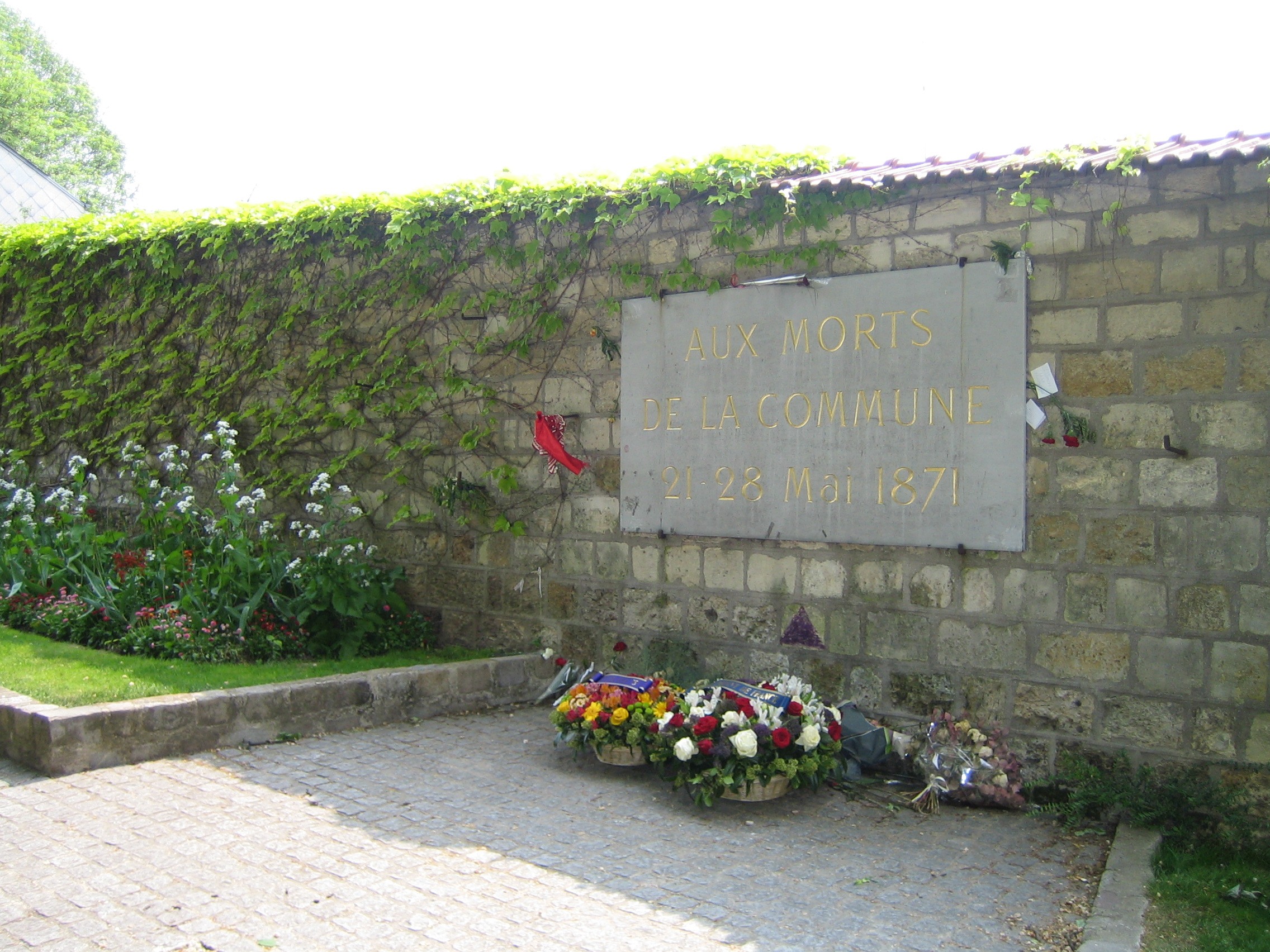
Sites
History of the Paris Commune (Marxists Internet Archive: Revolutionary France).
“Detailing the first workers government ever created, with primary documents describing the Commune and the events leading up to its creation and what happened after its fall, a time line of the Civil War, and an extensive photo gallery.” With Timeline, Documents, Archives of Communards, Contemporary observers, Photos and Encyclopedia.
Theme: Paris Commune (Libcom.org).
“The world’s first socialistic working class uprising which took place in Paris 1871. The mini-revolution was crushed as the exiled French government massacred 30,000 people.”
The Siege and Commune of Paris, 1870-1871 (Northwestern University Library Special Collection; online at Internet Archive).
“This site contains links to over 1200 digitized photographs and images recorded during the Siege and Commune of Paris c. 1871.”
Theme: Paris Commune 1871 (Workers’ Liberty, 2005).
Articles by Ernest Belfort Bax, Vladimir Lenin, William Morris, Max Shachtman and Martin Thomas.
Paris Commune History Links (Anarchy Archives).
With articles and pamphlets.
Articles (engelsk)
Frederick Douglass and Karl Marx on the Paris Commune and the Labour Question in the United States. By
The Paris Commune’s spirit is still alive. By Kristin Ross (Jacobin, September 26, 2024). Extract from The Commune Form: The Transformation of Everyday Life (Verso, 2024, 144 p.). “Thinkers like Karl Marx and Peter Kropotkin identified the commune as the political framework for a transformed, radically democratic society. We can find examples of this in some of the key social and environmental struggles of the world today.”
How did the Paris Commune shape British culture? By Simon Rennie (Catalyst Review, October 23, 2023).
Review of Owen Holland’s Literature and Revolution: British Responses to the Paris Commune of 1871 (Rutgers University Press, 2021, 240 p.). “British literary responses to the Paris Commune of 1871 expressed shock and fear about the collapse of the bourgeois social order. But they also registered sympathy with the Communards and their revolutionary aspirations.”
The Paris Commune was a unique experiment in running a city for its people. By Shelton Stromquist (Jacobin, March 18, 2023).
“On this day in 1871, the Paris Commune began its brief history before a conservative government drowned it in blood. While it lasted, the Commune sketched out a new way to run a major city based on democracy and the public good, not private profiteering.”
The Paris Commune as an historical turning point: On its 150th anniversary. By Seiya Morita (Links: International Journal of Socialist Renewal, September 10, 2021).
“Many articles have already been published around the world bringing back this historic event and developing new insights. This article is written as one of them.”
Understanding the Paris Commune on its 150th anniversary. By Dan La Botz (New Politics, August 4, 2021).
“What is the significance of the Paris Commune for us today? A model for socialists? A heroic failure? Negation of the state? Or the first workers’ government?”
See Part 2: Marx’s Commune: An appreciation and a critique (New Politics, Issue 71, Summer 2021).
Why the Paris Commune still resonates, 150 years later (Jacobin, May 28, 2021).
“The Paris Commune ended on this day in 1871, after just two months in power. How do we explain, Enzo Traverso asks, the longevity and freshness of the memory of a fleeting revolutionary government?”
Karl Marx saw signs of the socialist future in the Paris Commune (Jacobin, May 21, 2021).
David Broder interviews Stathis Kouvelakis: “Today marks 150 years since the start of the Bloody Week, when the French army drowned the Paris Commune in blood. For Karl Marx, the Paris revolution was the greatest working-class uprising in his lifetime — and a model for what socialism might look like.”
The significance of the Paris Commune. By Paul D’Amato (International Socialism Project, May 4, 2021).
“The Commune showed that workers must destroy the old state machine and replace it with their own organs of direct democracy. That is the great historical significance of the Commune, and why socialists still talk about it today.”
The Paris Commune and workers’ democracy: Lessons for the socialist movement (Tempest, April 13, 2021).
“Thomas Hummel draws some of the principled lessons of the Paris Commune that have guided the socialist left for 150 years, and asks how today’s Left measures up in having learned those lessons.”
Insurgent Communards: The Road to Revolution. Part 1. By Doug Enaa Greene (Left Voice, March 14, 2021).
“On the 150th anniversary of the Commune’s birth, it is worth remembering its heroism, history, mistakes, and lessons for our forthcoming struggles.”
See Part 2 (March 18) + Part 3 (March 21).
Celebrating the Paris Commune of 1871: ‘Glorious harbinger of a new society’ (Marxist Left Review, Issue 21, Summer 2021).
“Marxist historian Sandra Bloodworth commemorates the 150th anniversary of the Commune, retelling the breathtaking events as well as providing an assessment of their political significance.”
The Paris Commune is still a beacon for radical change. By Marcello Musto (Jacobin, March 18, 2021).
“On this day in 1871, the working class of Paris seized control of the capital and established the Commune. Though it ruled for just two months, the world’s first workers’ government still stands as a vivid example of the kind of society workers themselves can create, according to their own vision of freedom and equality.”
Paris Commune 150: the economics (Michael Roberts Blog, 18 March 2021).
“I shall just offer a few observations on the Commune’s economic policies. The most important was the failure to take over the financial levers of capital, in particular, the Banque de France.”
See also Eric Toussaint: The Paris Commune of 1871, banks and debt (CADTM, 19 February 2021).
The Communards were more than just beautiful martyrs. By Jean-Numa Ducange (Jacobin, March 18, 2021).
“150 years since the Paris Commune, the militants who built the world’s first working-class government are often commemorated as martyrs rather than taken seriously as revolutionaries. Yet in the years after 1871, socialists sought to draw practical lessons from this experience …”
The Paris Commune: triumph, tragedy and lessons for today. By Josh Holroyd (In Defence of Marxism, 18 March 2021).
“This excellent overview explains the main events and political processes of this inspirational watershed in the history of working-class struggle. The Communards’ heroic, triumphant, but ultimately tragic efforts to build the first workers’ government are filled with lessons for revolutionaries today.”
The Paris Commune of 1871. By Michael Löwy (International Viewpoint, 18 March 2021). “On 18 March 1871, in Paris besieged by Prussian troops, the people took control of their city and for 72 days conducted the first experiment of life under popular control.”
The Paris Commune taught the Bolsheviks how to win a Revolution. By Andy Willimott (Jacobin, March 18, 2021).
“Lenin was so enthused by the Paris Commune that he danced in the snow the day the Bolshevik government had lasted longer than its French forebear. Both the successes and ultimate defeat of the commune gave practical lessons to generations of Russian revolutionaries — most importantly, that working-class rule was possible.”
A short history of the Paris Commune. By Florian Grams (Rosa Luxemburg Stiftung, March 2021).
Background – The Social Democracy of the Commune – The Women of the Commune – The Fall of the Commune – Ongoing Relevance.
The Paris Commune — a workers’ democracy (Socialist Worker, Issue 2746, 15 March 2021).
“To celebrate the 150th anniversary of the Paris Commune Sam Ord looks at the importance of the first workers’ government, and how it influenced the ideas of Karl Marx.”
The Paris Commune: when workers ran a city (Counterfire, March 10, 2021).
“Ahead of the 150th anniversary of the Paris Commune, John Westmoreland looks at the first working-class government and why it’s an important historical milestone.”
The Paris Commune: the Cry of the People. By Ian Birchall and RS21 members (RS21: Revolutionary Socialism in the 21st Century, 3 March 2021).
“Over the coming three months RS21 will use articles from the Commune’s leading newspaper Le Cri du Peuple to draw out the history of the Paris Commune.” See more:
The Paris Commune: Order Reigns in Paris (15 March 2021).
Remembering the Paris Commune (18 March 2021). Video project.
Genderquake: socialist women and the Paris Commune. By Judy Cox (International Socialism, Issue 169, Winter 2021, p.103-127).
“This article does not aim to retell the stories of the female Communards, fascinating though they are. It aims to explore the impact of socialist women on the Commune and on the wider socialist tradition.”
Marx200: the Paris Commune and the Marx family. By Judy Cox (Counterfire, May 28, 2018).
“The Paris Commune only lasted from 28 March to 28 May 1871 but it inspired Karl Marx and continues to inspire and inform socialists today.”
Communal Luxury: The political imaginary of the Paris Commune. By John Westmoreland (Counterfire, May 15, 2015).
Review of Kristin Ross’ book (Verso, 2015, 156 p.). “Communal Luxury is an effective account of the 1871 Paris Commune, and how understanding it aids our struggle for freedom within a decaying capitalism.”
The Paris Commune: the face of proletarian revolution. Chapter 60 in Neil Faulkner: A Marxist History of the World (Counterfire, 30 January 2012).
“The Franco-Prussian war produced the first proletarian revolution in history, and showed to the world for the first time what a workers’ state looks like.”
Massacre. By Sarah Ensor (Socialist Review, Issue 399, February 2015).
Review of John Merriman, Massacre: The Life and Death of the Paris Commune of 1871 (Basic Book, 2015, 327 p.). “Merriman’s account celebrates the Commune, but largely focuses on its repression, revealing the disgusting gloating of the upper classes as they watched the slaughter of tens of thousands of working class people.”
Women in the Paris Commune. By Christina Gridley and Carolyn Kemp (In Defence of Marxism, 8 March 2012).
“In honor of International Working Women’s Day, we would like to highlight the efforts and achievements made by the working women during the Commune.”
Remembering the Paris Commune. By Keith Mann (Against the Current, Issue 153, July-August 2011).
“Reformist socialist, communist, and labor leaders haven’t been too anxious either to preserve or celebrate the memory of the Commune. It has been revolutionaries including anarchists, syndicalists, pre-Stalin communists, Trotskyists and leftwing academic historians who have done the most to preserve the memory of the Commune.”
Storming Heaven: The Paris Commune. By Charles Brown (Counterfire, 28 May 2011).
“140 years ago, the world’s first experiment in workers’ self-government came to an end. For a few short weeks the workers of Paris had given shape to a new kind of socialist politics from below.”
Inspirational feats and heroic failure. By Nick Rogers (Weekly Worker, Issue 867, May 26, 2011).
“In this article I want to provide a little of the background to the revolution that was the Paris Commune and ask what lessons Marxists can still draw from the experience of the Parisian working class 140 years ago.”
140th anniversary of the Paris Commune. By Greg Oxley (In Defence of Marxism, 27 May 2011).
“The Parisian workers strove, in extremely difficult circumstances, to put an end to exploitation and oppression, and to reorganise society on an entirely new foundation. The lessons of these events are of fundamental importance for socialists today.”
The Paris Commune, Marxism and Anarchism. By Iain McKay (The Anarchist Library, April 22, 2008).
“An anarchist analysis of the Paris Commune of 1871, showing how it was influenced by anarchism and what lessons anarchists drew from it. It also discusses the Marxist and Leninist analyses of the Commune, showing how alien Leninism is to the spirit of the Commune and to the genuine Marxist theory of the state.”
72 days that shook the world. By Chris Nineham (International Socialism, Issue 111, Summer 2006).
Review of Donny Gluckstein, The Paris Commune: A Revolution in Democracy (Bookmarks, 2006, 255 p.). “Gluckstein tells the Commune’s dramatic story through a series of analyses of the economics of Paris, the Commune’s social programme, its military defence and the politics of its leaders. He keeps current debates in mind throughout.”
Paris, 18 March 1871. By Ian Birchall (Socialist Review, Issue 228, March 1999; online at Internet Archive).
“… for the first time working people had shown they could take power into their own hands. The Commune was to be an example and an inspiration for the next generation of socialists.”
The Commune, Paris 1871. By Maurice Brinton (Solidarity, Vol.1, No.6, May 1961; online at Marxists Internet Archive).
“The most significant aspect of the Paris Commune is that it created social forms which in a sense define socialism itself, social forms which serve as yardsticks for proletarian revolutions passed, present and to come.”
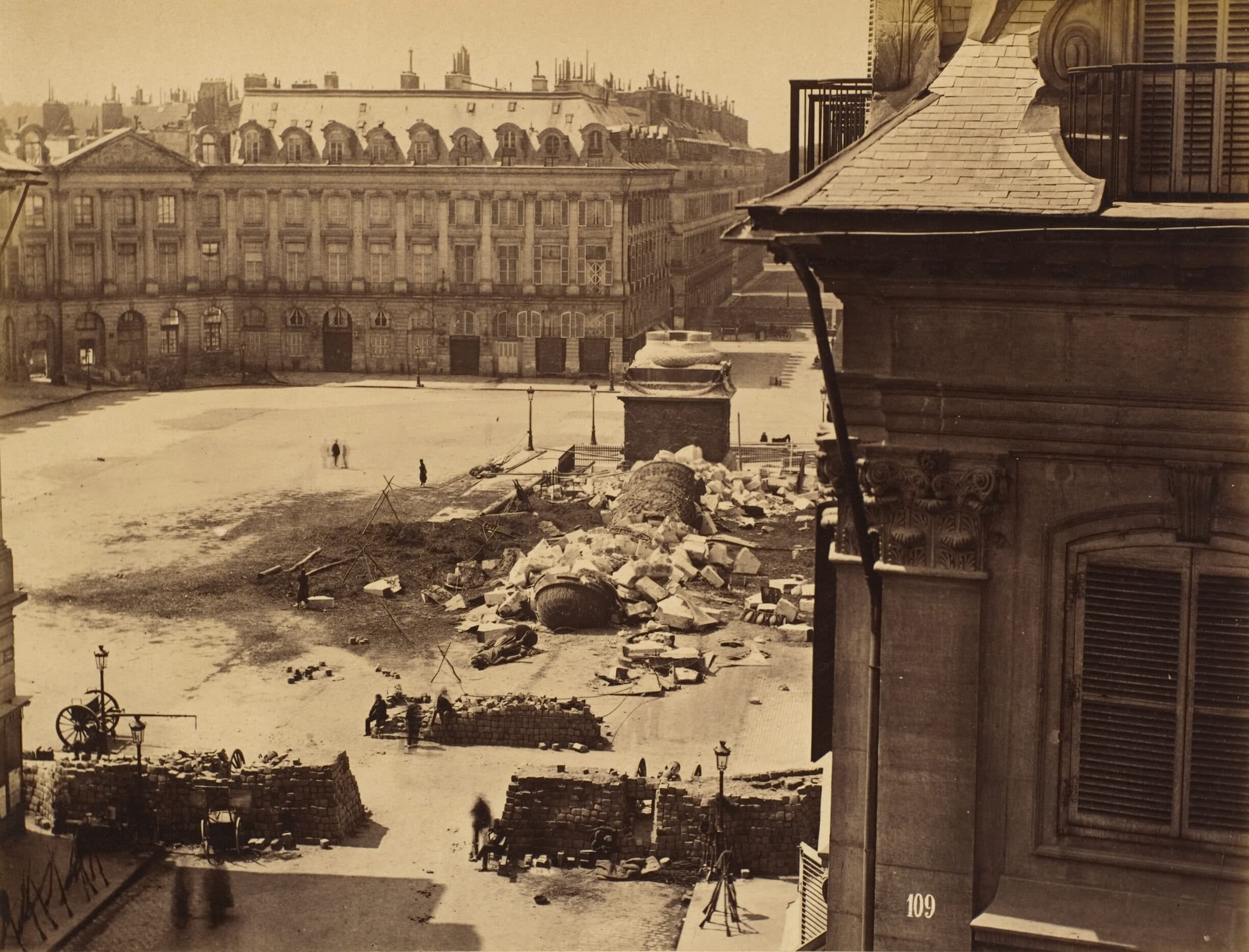
Historiske tekster og debat
på dansk/skandinavisk
Læren af Pariserkommunen (1921). Af Leon Trotskij. I: Pariserkommunen 1871. Et dokumentarium. Red. Thorvald Berthelsen og Claus Clausen (Forlaget Rhodos,1972, s. 203-19; online på Marxisme.dk).
“Kommunen viser os de arbejdende massers heltemod, deres evne til at forenes i en eneste blok, deres beredvillighed til at ofre sig selv for fremtiden, men samtidig viser den også massernes manglende evne til selv at vælge deres vej, deres ubeslutsomhed når det gælder at lede bevægelsen …”
Erfaringerne fra Pariserkommunen 1871: Marx’ analyse. Kap. 3 i V.I. Lenin: Staten og revolutionen (Udvalgte Værker, bind 9, Forlaget Tiden, 1976, s.42-61; online på Marxisme.dk).
“Kommunen er den proletariske revolutions første forsøg på at sønderslå den borgerlige statsmaskine, den ‘endelig opdagede’ politiske form, der kan og skal afløse det sønderslåede.”
Pariserkommunen (Borgerkrigen i Frankrig). Af Karl Marx (Udvalgte Skrifter, bind 1, Forlaget Tiden, 1971, s.468-543; online på Marxisme.dk).
“Arbejdernes Paris med sin Kommune vil til evige tider blive fejret som den berømmelige bebuder af et nyt samfund. Dens martyrer gemmes i arbejderklassens store hjerte. Dem, der tilintetgjorde den, har historien allerede nu naglet til den skampæl, som alle deres præsters bønner ikke vil magte at frelse dem fra.”
Pariserkommunen (1895). Af Pjotr Kropotkin. I: Tværfagligt projekt: Pariserkommunen 1871. Red. Karen Nicolajsen (Gyldendal, 1975, s.60-68; online på Sorte Fane Blog).
Indhold: 1. Kommunens plads i den socialistiske udvikling. 2.Hvorledes det mislykkedes for Kommunen at realisere sit egentlige mål og alligevel at stille dette mål op for eftertiden. 3. Kommunens lære i moderne socialisme.
Pariserkommunen: Dens Aarsag og Følger. Af Nic. L. Petersen (Eget Forlag, 1891, 31 s.; online på Marxisme.dk). Pjecen er genoptrykt i Uffe Østergaard (red.): Den materialistiske historieopfattelse i Danmark før 1945 (Modtryk, 1973, s.141-171). Om Nikolaj L. Petersen, se Tidslinjen 18. november 1854.
Om statsbegrebet og Pariserkommunen (1871). Af Michael Bakunin. I: Tværfagligt projekt: Pariserkommunen 1871. Red. Karen Nicolajsen (Gyldendal, 1975, s.53- ; online på Sorte Fane Blog).
In English:
They showed the way to labor emancipation: On Karl Marx and the 75th anniversary of the Paris Commune. By C.L.R. James (Labor Action, 18 March 1946; online at Marxists Internet Archive).
“The American working class is not yet as familiar as the European working class with the history and traditions of the revolutionary socialist movement. March 14, anniversary of the death of Karl Marx, and March 18, anniversary of the Paris Commune will be celebrated by only a small minority.”
The Paris Commune – A Story in Pictures (pdf). By William Siegel (International Publisher, 1931, 31 p.) (John Reed Club, 12). With introduction by Alexander Trachtenberg.
1871: The Paris Commune. By Max Shachtman (Daily Worker Publishing; The Little Red Library, No.8, early 1920s; online at Marxists Internet Archive).
History of the Paris Commune of 1871 (1876) (Marxists Internet Archive).
“Prosper Olivier Lissagaray was a participant in the Paris Commune and his critical eye-witness account was published in French in 1876. Eleanor Marx translated the work into English and the manuscript was revised and checked by Karl Marx.” (Trykt tekst ca. 500 s.). See also William Clare Roberts: After the Commune: learning the lessons of failure (Spectre, May 26, 2021).
Karl Marx: The Civil War in France (1871) (Marxists Internet Archive).
“A book by Karl Marx detailing the events and political significance of the commune. Written as an address to the International, Marx explained the events underway in France with the purpose of distributing the information to workers all around the world.”
Dansk udgave ovenfor.
A short account of the Commune of Paris of 1871. By E. Belfort Bax, Victor Dave and William Morris (The Socialist Platform, No.4, 1886, 20 p.; online at Marxists Internet Archive).
Contemporary observers of the Paris Commune (Marxists Internet Archive). With Books, Documents and Contemporary Pamphlets.
The Kautsky-Trotsky debate (Marxists Internet Arcive)
- Karl Kautsky: Terrorism and Communism. A Contribution to the Natural History of Revolution (1919).
IV.: The First Paris Commune: The Paris Proletariat and Its Fighting Methods, The Failure of Terrorism.
V.: The Traditions of the Reign of Terror.
VI: The Second Paris Commune, The Origin of the Commune, Workmen’s Councils and the Central Committee, The Jacobins in the Commune, The International and the Commune, The Socialism of the Commune, Centralisation and Federalism, Terrorist Ideas of the Commune. - Leon Trotsky: Terrorism and Communism [Dictatorship versus Democracy]: A Reply to Karl Kautsky (1920).
Chapter 4: Terrorism.
Chapter 5: The Paris Commune and Soviet Russia.
Litteratur
Dansk (+ svensk/norsk)
Pariserkommunen 1871 – utopi og realitet. Redigeret af Kenn Schoop, Ulla Jeppesen og Jesper Vestermark Køber (Selskabet for Arbejderhistorie, 2021, 190 s.) (SFAH’s skriftserie, nr. 60)
Se anmeldelser:
Hvorfor Pariserkommunen aldrig slipper os. Af Niels Finn Christiansen (SFAH, 16. april 2022). “Righoldig, mangfoldig og lærerig bog om, hvorfor Pariserkommunen aldrig slipper os … alle bogens bidrag (berettiger) til en kraftig opfordring: køb den og læs den.”
Et monoment over Pariser-kommunen 1871 i et for- og nutidigt perspektiv (pdf). Af Karsten Fledelius (Arbejderhistorie, nr.1, 2022, s.109-111).
“Det er kort sagt en bog, som kommer vidt omkring, og som åbner mange vinkler på et tragisk historisk forløb, som stadig efterlader kraftige erindringsspor i eftertiden, og stadig er vedkommende i det 21. århundrede.”
Pariserkommunen 1871. Red. af Anne-Lise Walsted og Vagn Buchmann (Arbejdermuseet og Arbejderbevægelsens Bibliotek og Arkiv, 1998, 40 s.).
Artikler af Søren Federspiel og Niels Finn Christiansen + billeder af Kommunen.
I flugt går tiden, 1871: Fra Pariserkommunen til den danske Internationale. Af Ib Koch-Olsen (Arbejderbevægelsens Bibliotek og Arkiv i samarbejde med Socialdemokratiet, 1971, upag., 79 s., A4-format). Billeder og blade fra Socialdemokratiets fødselsår 1871, bl.a. fra Illustreret Tidende og Socialisten.
“I dette dokumentarium er samlet det vigtigste af, hvad der blev skrevet under og om Kommunen. Foruden øjenvidneskildringer, opråb, mødereferater og andre samtidige dokumenter, bringer bogen uddrag af de senere diskussioner om Pariserkommunen i den internationale venstrebevægelse.”
Pariserkommunen 18. marts – 28. mai 1871. Af Kristian Gleditsch (Pax Forlag, 1971, 120 s.). Med Tillæg: dokumenter, kronologi, biografier og litteratur.
Paris’ fald: belejringen og kommunen 1870-71. Af Alistair Horne (Aschehoug Dansk Forlag, 1969, 456 s.)
Paris under Communen. Af Wilhelm Dinesen (Jacobs Lunds Boghandel, 1873, 334 s.; online på Open Library). 2. rev. udgave 1891, 400 sider. Genoptryk 1968 (Gyldendals Trane-Klassikere).
Wilhelm Dinesen (far til Karen Blixen) var officer og nedskrev den eneste danske øjenvidneberetning om Pariserkommunen: “en bog, som med urette kun vakte liden opmærksomhed og som meget for hurtigt blev glem .. giver en lærerig, upartisk, livfuld og … nøjagtig Udfoldelse af Tildragelserne i Paris … (med) materialer som forfatteren har bevaret fra hine dage og selvsyn … han har Øjnene med sig” (Georg Brandes: Danske Personligheder: Wilhelm Dinesen, om Paris under Kommunen, side 286-294; online på Runeberg.org).
Fra Paris. Af Meir Aron Goldschmidt. I: Fortællinger og Virkelighedsbilleder: ældre og nye (side 215-311; online på Runeberg.org). Tre besøg og indtryk, 1850, 1868 og 1871. Det sidste, 1871 (side 288-310) beskriver Pariserkommunen og dens nederlag, om standretterne m.m.
72 dagar i Paris (pdf). Av Folke Isaksson (Ordfront, 1984, 135 s.; online på Folkeisaksson.se). Indholdsfortegnelsen er til sidst!
Pariskommunen 1871: revolutionär myt och verklighet. Av Gunnar Gunnarson (Bo Cavefors, 1971, 270 s.)
English:
Paris Commune 150 (pdf) (LeftWord, 2021, 108 p.). With Introduction by Vijay Prashad: Opening the door to utopia (p.7-18), and text by Karl Marx, V.I. Lenin, Bertolt Brecht and Tings Chak.
Communards: The story of the Paris Commune of 1871, as told by those who fought for it. Texts selected, edited, and translated by Mitchell Abidor (Marxists Internet Archive Publications, 2010, 302 p.). See sample text, p.1-14, online at Marxists Internet Archive (pdf).
The Paris Commune: A revolution in democracy. By Donny Gluckstein (Bookmarks, 2006, 255 p.).
See review by Chris Nineham: 72 days that shook the world (International Socialism, Issue 111, Summer 2006).
Writings of the Paris Commune. By Karl Marx and Friedrich Engels. Edited by Hal Draper (Monthly Review Press, 1971, 248 p.).
“A centennial edition containing over 100 pages of previosly unavailable writings as well as fully annotated texts of the traditional writings.”
The Paris Commune of 1871: The View from the Left. Edited & introduction by Eugene Schulkind (Jonathan Cape, 1972, 308 p.).
The fall of Paris: the siege and the Commune, 1870-71. By Alistair Horne (Macmillan, 1965, 458 p.).
The Commune of Paris (1871). Annotated bibliography by Sharif Gemie (Anarchy Archives).
Skønlitteratur/skuespil:
På dansk:
Nederlaget: Et skuespil om Pariser-kommunen (1937). Af Nordahl Grieg (Gyldendals Teater, 1966, 134 s.). Teksten er norsk bokmål. Se online på norsk bokmål: Nederlaget: et skuespill om Pariserkommunen (Gyldendal Norsk Forlag, 1937, 204 s.).
Kommunens dage. Af Bertolt Brecht. Med sange, noter og efterskrift ved Jørgen Bonde Jensen og Karen Nicolajsen (Gyldendal, 1966, 133 s.). Skuespil, 1948/49.
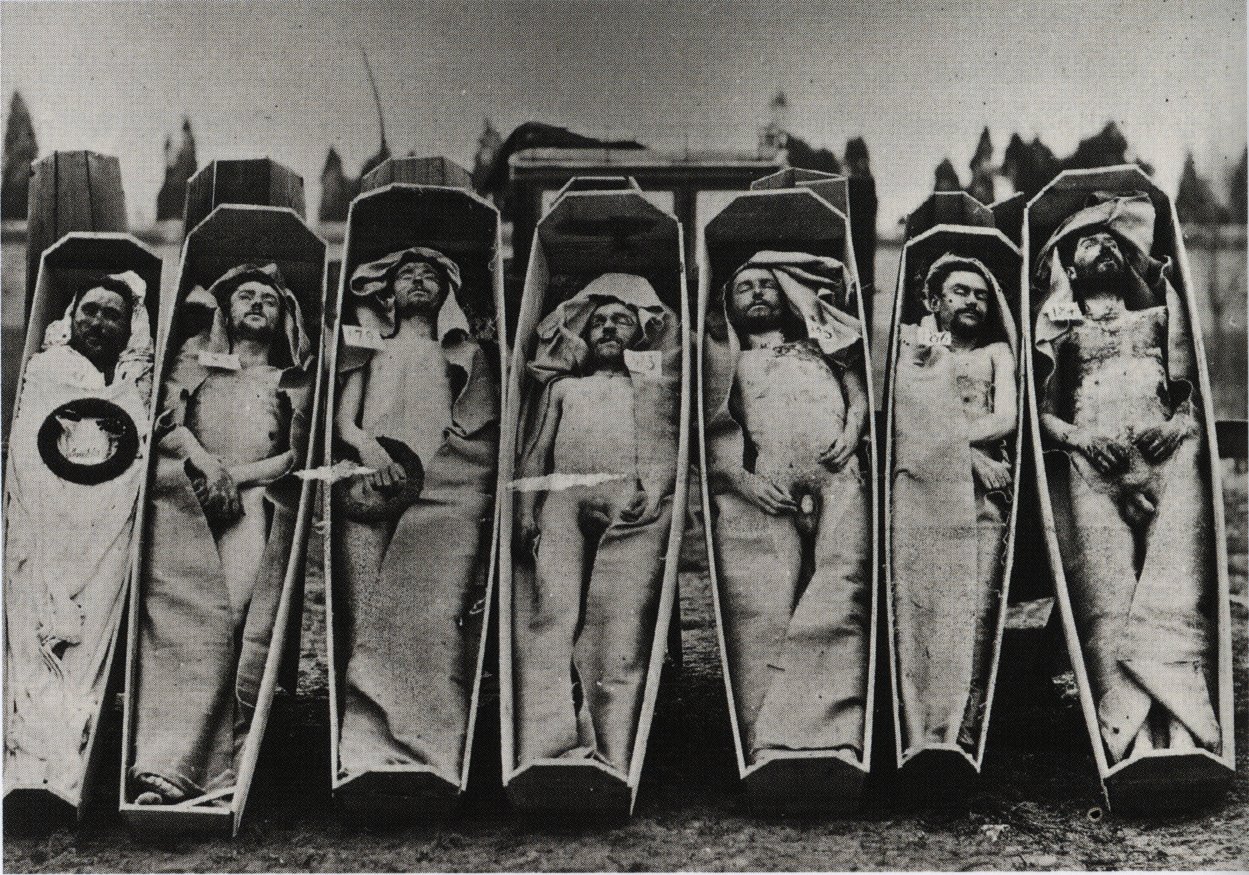
Hærens dekret efter sejren: “Idag er Striden endt. Orden, Arbeide, Sikkerhed vil vende tilbage.”
“Medens Arbeiderqvartererne vare døde og mørke, begyndte Livet atter i det rige, prægtige Paris … den livlige franske Fane gav Byen et festligt Udseende. Men … denne Fanes … Forsvarere havde unødvendigt udgydt saa meget Blod, at alle Flagene heri kunde farves lige saa røde som Communens.” (Wilhelm Dinesen, Paris under Communen, 1891, side 300 + 302).
Se også
La Commune (de Paris, 1871): The Paris Commune of 1871 – a brief historical background (Peter Watkins).
Se mere om filmprojektet La Commune (Paris 1871) på IMDb.com.
On YouTube: (French) – Part I (113 min.) – Part II (180 m.).
See Ben Lewis’ review of the film: Truth, memory and distortion (Weekly Worker, Issue 867, May 26, 2011).
















